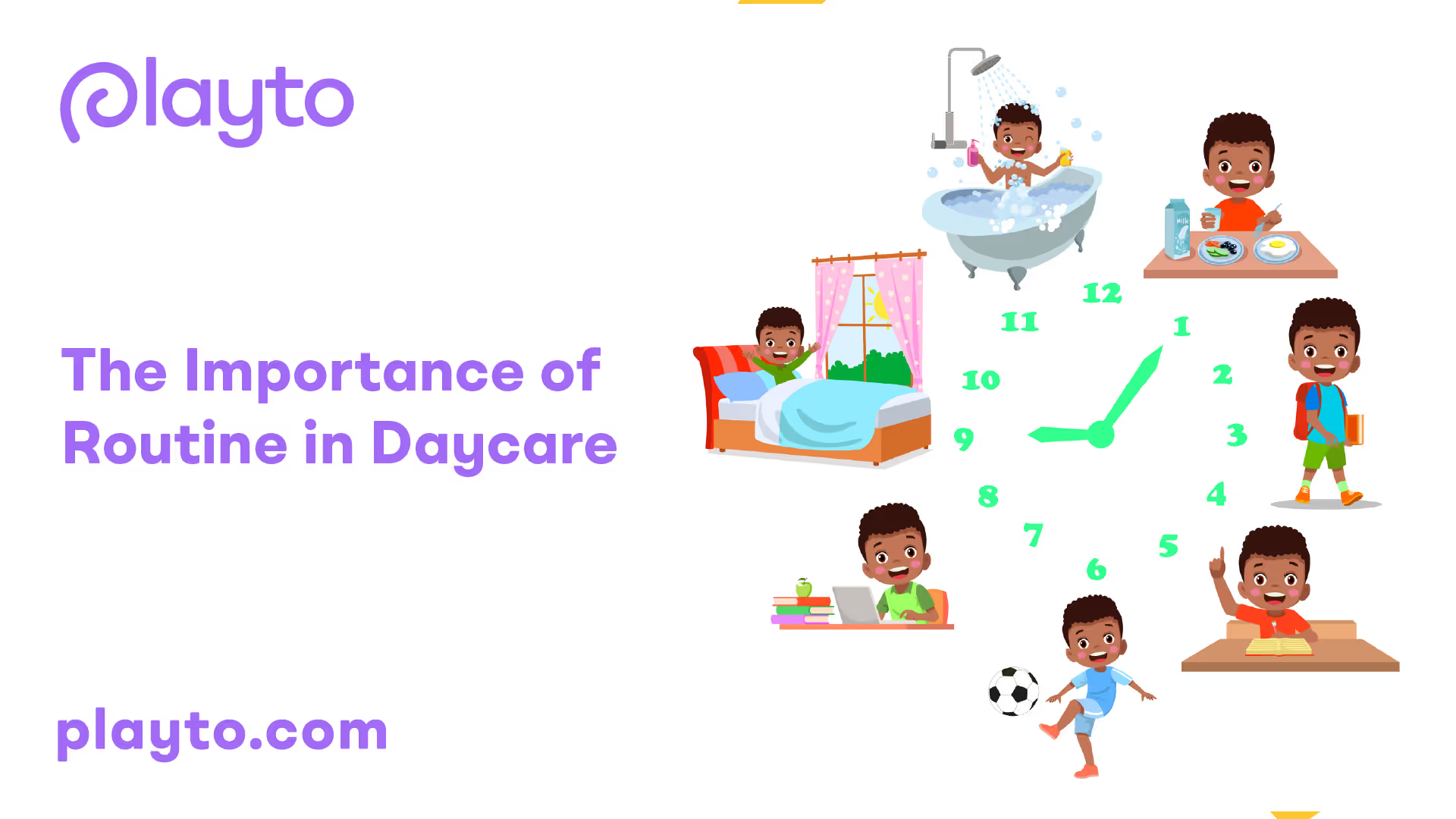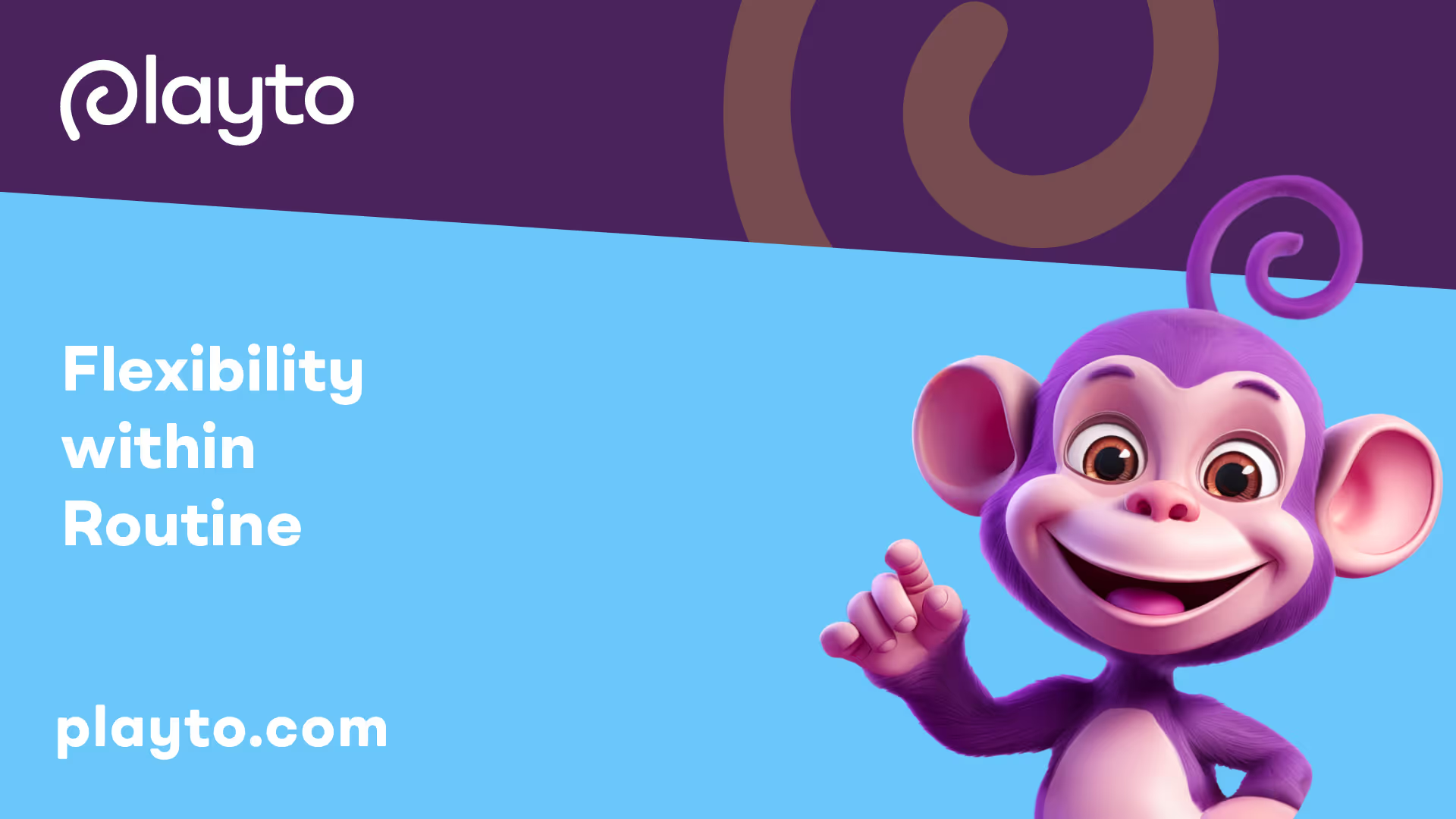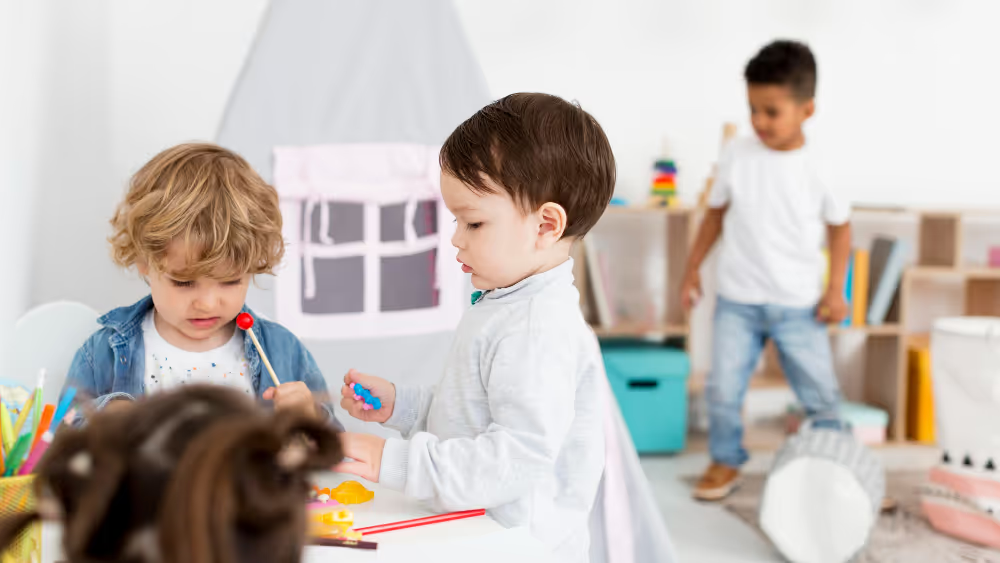Importance of Routine in Daycare
Establishing a routine in daycare is of paramount importance for the overall well-being and development of children. A well-structured routine provides numerous benefits and helps in syncing with children's internal clocks, creating a harmonious environment.

Benefits of Establishing a Routine
A routine acts as a guiding force for both children and caregivers, providing predictability and structure in a daycare setting. It offers several benefits, including:
- Sense of Security: A consistent daily schedule and step-by-step routines give children a predictable day, which fosters a sense of security. When children know what to expect, they feel more secure and confident, reducing anxiety and promoting a positive emotional state.
- Enhanced Self-Regulation: Regular routines help children develop self-regulation skills, which are crucial for healthy social-emotional development. By following routines, children learn to identify and manage their feelings, adapt to challenges and stressors, and develop important self-help skills.
- Maximized Learning Time: Structured routines allow for the maximization of learning time. By carefully planning routines and teaching children how to be successful within them, daycare providers can create an environment where learning opportunities are optimized and challenging behaviors are reduced [3].
Syncing with Children's Internal Clocks
Routine in daycare syncs with the internal clocks of children, allowing them to develop a sense of time and stability. By following predictable schedules, children are better able to anticipate what comes next, which helps them feel more secure and confident. Additionally, consistent routines promote healthy sleep patterns, ensuring that children receive adequate rest, which is crucial for their growth and overall well-being [4].
To effectively sync with children's internal clocks, daycare providers should establish consistent meal times, nap times, and play times. This regularity helps children develop a sense of rhythm and allows their bodies to adjust to the routine, promoting healthy development and behavior.
By prioritizing the establishment of a routine in daycare, caregivers create an environment that fosters stability, predictability, and optimal growth for children. The routine acts as a cornerstone, providing a framework for development and promoting a positive and nurturing atmosphere for children.
Structure and Predictability

In a daycare setting, implementing a routine provides structure and predictability for both children and child care providers. Time, when structured through a routine, becomes a comforting ally, fostering a calm and composed atmosphere and promoting behavior that reflects a sense of security.
Time as a Comforting Ally
When children have a consistent and predictable routine, they develop a sense of familiarity and understanding of what is expected of them throughout the day. This helps them feel secure and confident in their environment. Knowing what comes next provides a sense of comfort, as children can anticipate and prepare for transitions and activities.
By following a routine, children can develop a sense of time and learn to manage it effectively. They become more aware of the sequence of events and can internalize the structure, allowing them to participate actively in their own daily routines. This sense of control and predictability contributes to their overall well-being and helps reduce anxiety and stress.
Fostering a Calm Atmosphere
A well-established routine in daycare creates a calm and composed atmosphere. When children know what to expect, there is less confusion and uncertainty. This predictability helps minimize disruptive behavior and distractions, allowing children to focus and engage more effectively in activities.
Moreover, routines provide an opportunity for positive adult-child interactions. Caregivers can use routine activities, such as mealtime or circle time, to engage with children, promote social interactions, and model appropriate behavior. Consistent routines also help caregivers establish clear expectations and provide guidance, which further contributes to a calm and nurturing environment.
By fostering a calm atmosphere through routine, children can feel safe and supported, enabling them to explore, learn, and develop important social, emotional, and cognitive skills.
Implementing a structured routine in daycare not only benefits children but also supports child care providers in managing their daily responsibilities and ensuring a smooth and efficient operation. The next section will explore the flexibility within routine, including how to adapt to unexpected events while ensuring stability for children.
Flexibility within Routine

In a daycare setting, routines play a vital role in providing structure and predictability for children. However, it is equally important to have flexibility within the routine to adapt to unexpected events while ensuring stability for the children.
Adapting to Unexpected Events
While routines are essential in daycare, unexpected events can arise that disrupt the established schedule. It is crucial for childcare settings to be able to adapt to these events while maintaining stability for the children.
For example, if a planned activity cannot take place due to inclement weather or an unforeseen circumstance, daycare providers can use this opportunity to engage children in alternative activities that still align with the overall routine. This flexibility allows for spontaneity and keeps the schedule fresh and engaging for the children [3].
Ensuring Stability for Children
While unexpected events may disrupt the routine, it is important to prioritize stability for the children. Children thrive in environments where they feel secure and know what to expect. By maintaining a sense of stability even during unexpected changes, daycare providers can help children feel safe and supported.
One way to ensure stability is to communicate any changes in the routine to the children in a clear and age-appropriate manner. This helps them understand why the change is happening and what to expect. Additionally, providing consistent and reliable care during times of disruption helps children feel secure and builds trust in their caregivers.
By balancing flexibility and stability within the routine, daycare providers can create an environment that is adaptable to unexpected events while still providing the necessary structure and predictability for the children. This approach supports their social and emotional development, helps reduce challenging behavior, and fosters a sense of security and well-being.
Routine as a Cornerstone
In the realm of daycare, routine plays a pivotal role, providing stability, predictability, and a framework for growth and development. It benefits both children and caregivers by creating a nurturing and supportive atmosphere. Let's explore the importance of routine as a cornerstone in daycare.
Providing Stability and Predictability
Routine in daycare helps provide a sense of stability and predictability for children. According to ChildCareEd, a consistent daily schedule and step-by-step routines give children a predictable day, making them feel more confident and secure. When children know what to expect, they can navigate their environment with ease and feel a sense of control.
Structured routines offer a familiar and safe environment, allowing children to feel more at ease and reducing anxiety. This stability helps children develop a sense of trust in their caregivers and surroundings, fostering a positive and secure attachment.
Framework for Growth and Development
Regular routines in daycare provide a framework for children's growth and development. According to the Virtual Lab School, structured routines support cognitive, social, and emotional development, as well as self-help skills.
By carefully planning routines and teaching children how to be successful in those routines, daycare providers can maximize learning time and reduce challenging behavior. Routines help children understand expectations, learn self-regulation skills, and develop important life skills such as time management, responsibility, and independence.
Establishing routines that include activities like sensory play, snack time, and group activities can further enhance children's development. For more information on specific activities, check out our articles on sensory play in daycare settings and daycare snack ideas for picky eaters.
By incorporating routines into the daily daycare experience, children are given the opportunity to thrive and grow in a structured and supportive environment.
In addition, routines also have a positive impact on children's social-emotional development. According to Zero to Thrive, routines support healthy social-emotional development by helping children develop self-regulation skills, which are the building blocks of good mental health. Regular routines at daycare help children identify and manage their feelings, adapt to everyday challenges, and reduce stressors.
Overall, routine acts as a cornerstone in daycare, providing stability, predictability, and a framework for growth and development. It offers children a sense of security, fosters their cognitive and social-emotional development, and prepares them for future success. Caregivers and parents alike can play a significant role in implementing and maintaining routines that support children's well-being and overall development.
Familiar Activities for Comfort
In daycare settings, familiar activities play a crucial role in providing confidence and security for children. When daily activities are predictable and familiar, children feel more confident and secure, allowing them to develop relationships with their caregivers and gain a sense of belonging and self-confidence. Having a consistent daily schedule and step-by-step routines gives children a predictable day, which is especially important during challenging and uncertain times.
Routines and familiar activities provide a comforting structure for children, allowing them to navigate their day with a sense of familiarity and predictability. Research shows that routines support healthy social-emotional development in early childhood. Children who have regular routines at home develop self-regulation skills, which are the building blocks of good mental health. By identifying and managing their feelings, children are better equipped to adapt to everyday challenges and stressors.
In addition to promoting emotional well-being, familiar activities also foster a sense of stability and consistency for children. Children thrive when they have relationships and environments that are predictable to them. Examples of routine moments that provide accessibility and meaningful participation include bedtime routines and dinnertime routines. These routines allow children to engage with their caregivers and peers in a familiar context, enhancing their sense of security and belonging.
During challenging and uncertain times, familiar activities and routines take on an even greater importance. They provide a sense of normalcy and help children cope with stress. Rituals, a special kind of routine, add an additional layer of predictability and connection among family members. They impart a sense of family identity and contribute to positive developmental outcomes for children [2].
Parents and caregivers can adapt routines during crises by creating schedules or morning meetings to set priorities for the day, maintaining at least one consistent mealtime for the family, and being firm with rules that matter most in the long term, such as safety and kindness. Children thrive with predictable parents and focused moments of positive interaction.
By incorporating familiar activities and routines into daycare settings, caregivers can provide a comforting and secure environment for children. These activities not only enhance their confidence and security but also contribute to their overall growth and development.
Challenges in Daycare Management
Running a daycare comes with its own set of challenges. Childcare providers face various obstacles that require careful management and attention. In this section, we will discuss two common challenges in daycare management: enrolment and attendance management, as well as policies and procedures implementation.
Enrolment and Attendance Management
Managing enrolment and attendance is essential for maintaining a safe and effective daycare environment. Fluctuating numbers of children in care can pose challenges in ensuring a proper child-to-staff ratio. It is crucial to have a clear enrolment process in place, including proper documentation and communication with parents. Regularly communicating with parents about attendance and maintaining accurate records are key aspects of enrolment and attendance management. By doing so, childcare providers can ensure that they are meeting the needs of both the children and their families (Playground).
Policies and Procedures Implementation
Developing and implementing policies and procedures is vital for providing a safe and nurturing environment for children in daycare. Clear policies help establish guidelines for staff and parents, ensuring the well-being and safety of the children. Regular training sessions for staff members are necessary to ensure that they are familiar with and follow the policies and procedures in place. It is also important to regularly review and update the guidelines to comply with regulations and maintain effectiveness.
By effectively managing enrolment and attendance, daycare providers can ensure that they maintain a safe child-to-staff ratio and provide personalized care to each child. Implementing clear policies and procedures helps create a structured and secure environment for children to thrive in. These challenges demand attention and proactive management to ensure the overall success and well-being of the daycare facility.
In addition to enrolment and attendance management and policies and procedures implementation, daycare providers face other challenges such as maintaining a healthy and safe environment, managing behavior and discipline, providing high-quality education and activities, and more. To learn more about these challenges and their solutions, check out our articles on handling behavioral issues in daycare, sensory play in daycare settings, daycare snack ideas for picky eaters, and developing social skills in daycare.
